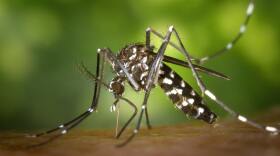We spoke with Kiera Butler about the truth behind bug spray and came away with some interesting facts. For instance, those bug sprays professing scents like cedar wood or ‘silky vanilla’ are by no means guaranteed to actually do a good job of keeping away bugs. You know what is? DEET.
According to Butler, due to the increase of insect borne illnesses, DEET is a tested-and-true method for keeping the bugs away. Although studies have shown minimal health risks associated with DEET in commercial products, some people still prefer a more natural route. It’s important to note that these solutions have not been tested enough to prove to be good ways of warding off insects, though you’ll find many proponents of natural remedies who defend them. If you’d like to put nature to the test, we’ve made a list of some of the popular plant solutions to avoiding bug bites.
Catnip: In 2001, Iowa State University published a report that found catnip to be an even more potent repellent of mosquitos than DEET. Catnip is related to the mint family and grows easily in most areas of the United States, though it’s recommended that you be careful where you plant it if you have a cat – they really do love the stuff and other plants may be in danger of being tousled if they are too close by.

Marigolds: These plants have long been known to help keep beetles from ruining other plants and are especially popular as a border for home vegetables patches, but they can also serve as mild protection against mosquitos and other bugs. They are widely available and bloom from the spring into the fall, so they can help keep your yard a little freer from pests for three seasons worth of outside activities.
Citronella: This lemony scent will be familiar to anyone who has ever sat around a mosquito repelling candle. The plant itself grows in grassy clumps which can reach 5 to 6 feet in height. These plants also have a long season and, like many other grasses, do best when left alone in sunny locations.

Lemon Balm: This is another member of the mint family and contains high levels of citronellal (sound familiar?) which helps to repel many unwanted bugs. Bumble bees and butterflies tend to flock to these plants, so those with certain allergies may want to steer clear of this particular herb, but for many others they are a fragrant addition to a backyard garden.

Lavender: Among the many toted virtues of this herb is its ability to keep mosquitos and fleas away. The scent of the plant, and even more potent, lavender oils, are widely used in natural bug sprays and as an alternative to other chemical solutions. While it doesn’t spread rampantly like those plants belonging to the mint family, lavender typically does well in the summer months in many parts of the US.
Do you have any tested and true home remedies for bug bites? You can leave them in the comments below or on our Facebook page. Plus, you can listen to the whole interview with Kiera Butler here.







